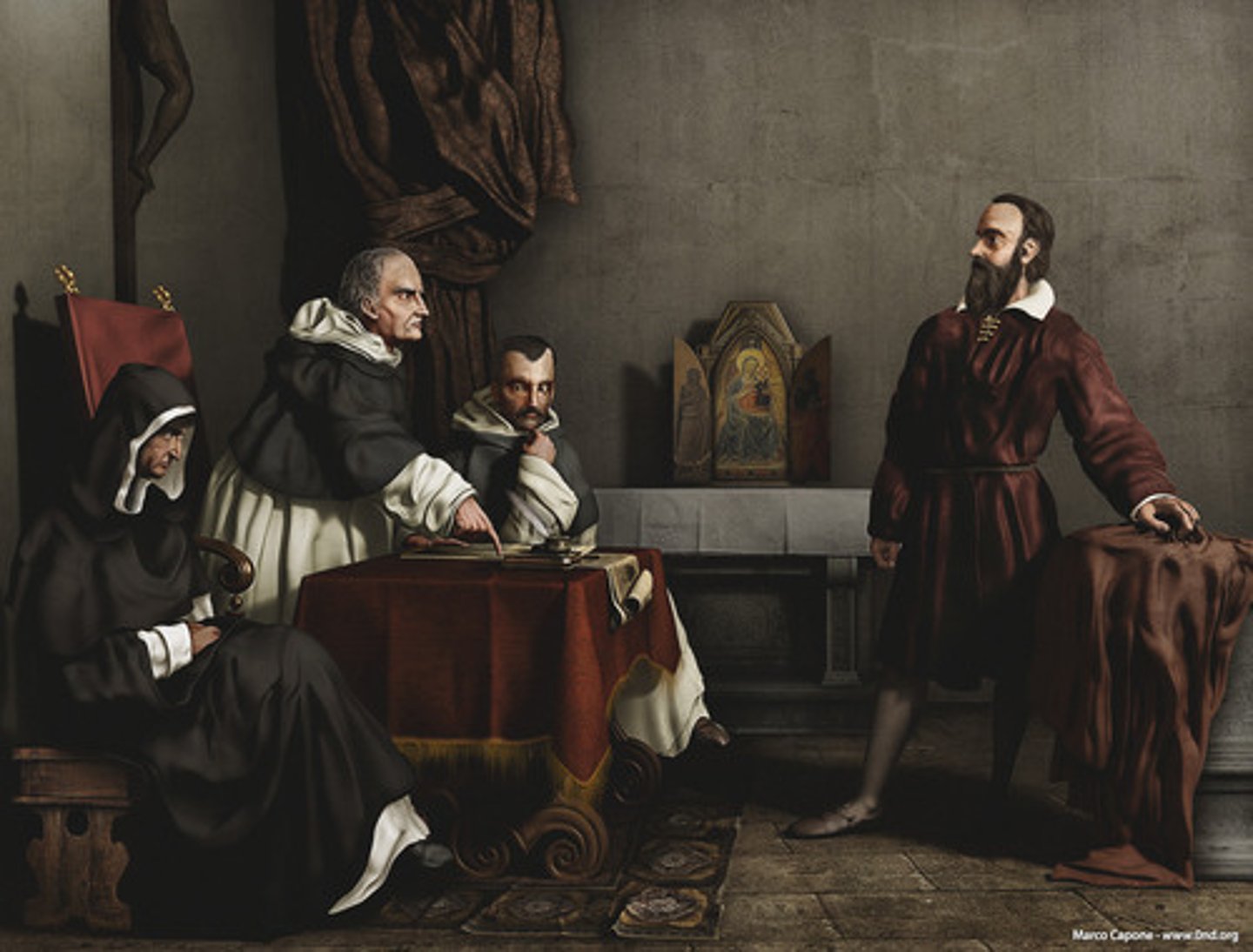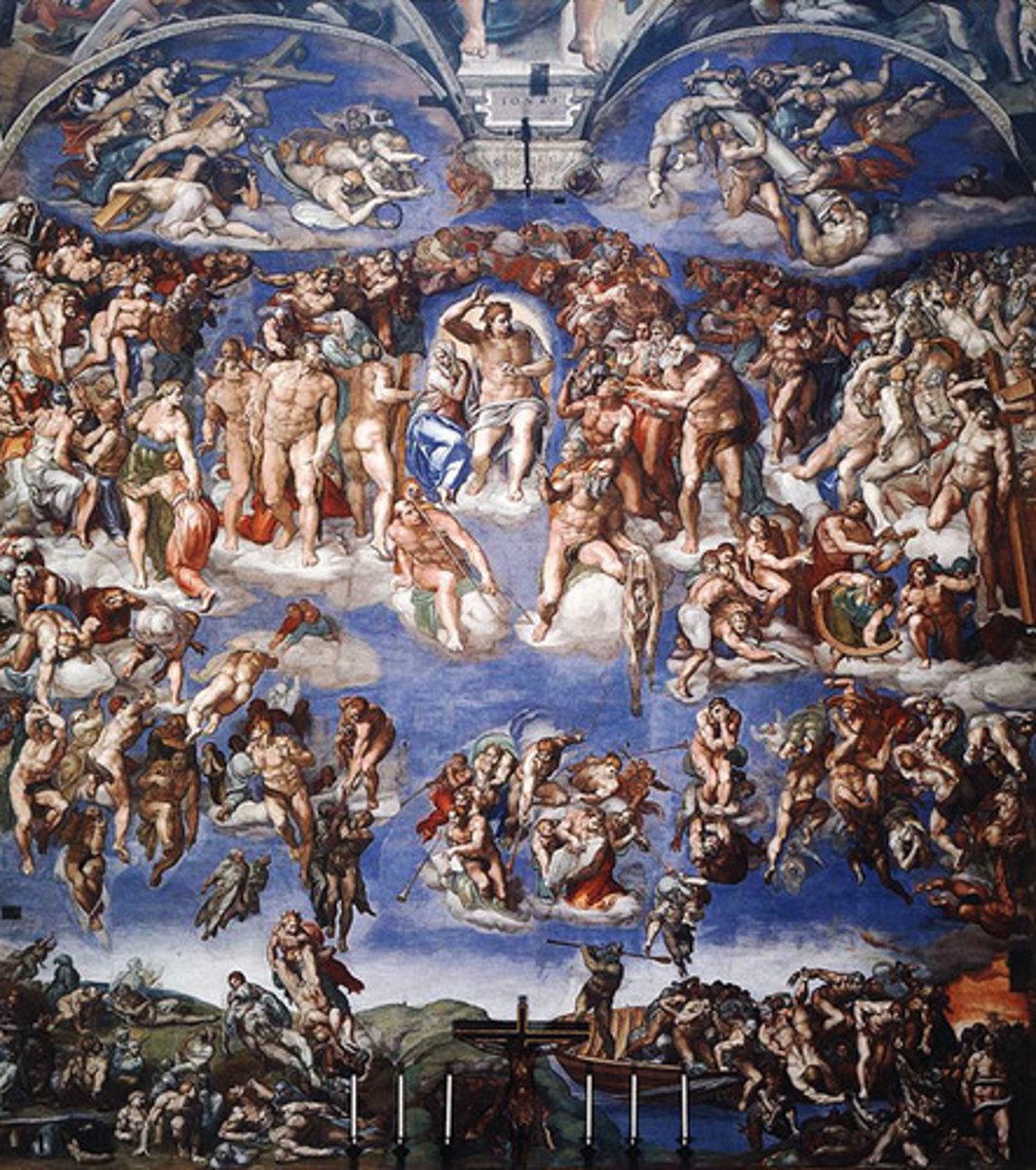Intro to Christianity Exam 3
1/60
There's no tags or description
Looks like no tags are added yet.
Name | Mastery | Learn | Test | Matching | Spaced |
|---|
No study sessions yet.
61 Terms
Galileo
-said that the earth revolved around the sun
-conflicted with catholic churches teachings
Inquisition CONDEMNED Galileo in 1633 --> made him recant
The Inquisition
was a part of the Counter-Reformation's effort to enforce orthodoxy
Methods: operated only on baptized catholics, used torture/exile/execution to obtain confession
-said punishment was for public good to keep others from heresy

Council of Trent
-central council of the Counter- Reformation, in response to Protestant Criticism
REFORMS: banned indulgenes for financial gain, improved priest education and discipline
REAFFIRMED: faith and works both essential for salvation, seven sacraments upheld, kept saints/relics/mary/pilgrimages, only priest can take both bread and wine in communion , established strict criteria for approving miracles
The Counter-Reformation
-movement by the Catholic Church to renew spiritual life and reassert authority after Protestant challenges
-It emphasized obedience, orthodoxy, and the miraculous as marks of divine truth.
-included new religious orders, use of the inquisition, and art/ architecture promoting emotional faith

Peace of Westphalia
-ended 30 years war (began as religious conflict between protestants and catholics)
-recognized state sovereignty and allowed rulers to choose their realms religion
-MARKED DECLINE OF PAPAL POLITICAL POWER AND BEGINNING OF SECULAR STATE-CENTERED EUROPE
George Washington
-embodied enlightenment ideals- reason, virtue, and moral self discipline, but maintained respect for providence (divine order)
-REPRESENTED BALANCE BETWEEN ENLIGHTENMENT RATIONALISM AND RELIGIOUS FAITH
-saw religion as essential to public morality and civic virtue
Benjamin Franklin
-key enlightenment figure
-valued science but also saw religion as socially valuable for teaching ethics and civic responsibility
-promoted religious tolerance through orthodox doctrines
The Great Awakening
-religious revival acting against enlightenment
-emphasized emotional conversion, personal repentance and direct experience with God
-reinvigorated protestant christianity and democratized religion
-created divide between Evangelicals and high church / rationalist clergy
The Enlightenment vs the Great Awakening
-The enlightenment: emphasized reason, science and natural law, challenging christian authority and miracles
-The Great Awakening : emotional preaching and moral reform
Peace of Augsburg
Allowed German princes to choose between Catholicism or Lutheranism.
Thirty Years’ War (1618–1648)
: Religious and political war that devastated Central Europe (about 30% of the Holy Roman Empire’s population died).
Jesuits
focused on education, missionary work and loyalty to the pope
-spread catholic faith globally (asia, americas)
Mystical Piety
Teresa of Avila: Emphasized interior prayer, personal experience with God and obedience to divine will
Cessationism
belief that certain miraculous spiritual gifts, such as speaking in tongues, prophecy, and healing, ceased with the end of the apostolic age
-rejected by Catholics --> God still acts in the world
-Eucharist viewed as a continuing miracle of divine presence
Post-Millennialism
Belief that Christian moral progress will bring about a golden age of righteousness before Christ’s return.
-Stresses human responsibility in building God’s kingdom on earth.
How did exploration change our definition of the world
-Before 1500s, “the world” = Europe, North Africa, and the Middle East.
-With the discovery of the Americas and China, the world became much larger—new contact, trade, and religious ideas.
-Exploration and missions expanded Christianity globally, often outside the authority of popes, kings, and cathedrals, allowing new religious expressions to form.
René Descartes
introduced dualism (mind vs. matter).
Charles Darwin
Origin of Species—evolution through natural selection.
Thomas Huxley (1892)
"scientific naturalism”—science as the ultimate framework for truth.
Scientism
the view that religion should be studied and judged by scientific methods.
Thomas Aquinas:
Miracles are contrary to nature (contra naturam).
Augustine:
Miracles are beyond human understanding (supra naturam).
Providence
God acting through nature
-Special providence: God’s care for individuals (seems to defy natural law).
-General providence: God’s ordering of the world through natural law.
David Hume (1748):
Miracles contradict the regularity of nature and are so improbable that no testimony can validate them.
John Tyndall:
Miracles are invalid because nature is ultimately unknowable—lack of explanation doesn’t prove divine action.
James Mozley:
Argued that the uniformity of nature is descriptive, not absolute—miracles can occur without breaking reason.
Horace Bushnell (1858)
Claimed faith loses credibility if miracles are dismissed as “ancient myths”—they remain relevant.
Henry VIII and Elizabeth I
Created the Church of England (Anglicanism)—rejected papal authority.
Mary I (“Bloody Mary”)
Restored Catholicism, persecuted Protestants.
Elizabeth I
:Restored Protestantism but tolerated limited diversity; Elizabethan Settlement (1559) required church attendance but eased anti-Catholic laws.
Puritans
wanted deeper reform -- known as "hotter Protestants"
-Separatists: left the church
-Non-seperating puritans: stayed to reform from within (John Winthrop/ Massachusetts Bay)
Pietistic Revivals (1670s)
Stressed “heart religion” over ritual formalism.
Leaders of the Great Awakening
John Wesley, George Whitefield, Benjamin Franklin , Phillis Wheatley, Samson Occom
John Wesley
founder of methodism, focus on grace + holiness
George Whitefield
Dynamic preacher; revivalist; opposed "unconverted" clergy
Phillis Wheatley
linked natural rights + faith + reason
Samson Occom
First Native author in English; merged Christianity with indigenous identity
The Second Great Awakening key beliefs/practices
anxious bench, women prayed publicly, multi-day revivals with emotional preaching, immediate church membership after conversion
Postmillennialism
-The world can be improved through moral and social reform, preparing for Christ’s return.
-Optimistic view of human nature: people can choose good and promote justice.
Moral Suasion
-Reform through persuasion and conscience, not just law or punishment.
-Emphasis on individual repentance leading to social change.
Richard Allen (1760–1831)
-Founded the African Methodist Episcopal (AME) Church in Philadelphia (1787).
-Created the first independent Black denomination in the U.S.
Jarena Lee (1783–c.1850)
-Member of AME Church (joined 1804).
-Felt a divine call to preach and emphasized “baptisms of the Spirit.”
-First authorized female AME preacher (1818).
-Published her autobiography, Life and Religious -Experience (1836; 1849), after the AME press refused to print it.
The Social Gospel
-Movement to apply Christian ethics to social justice issues like poverty and inequality.
-Claimed individual conversion was not enough; Christianity must transform society itself.
-Focused on earthly redemption—bringing the Kingdom of Heaven to earth through justice and compassion.
What key principles changed with the social gospel?
- competition --> cooperation
-self interest --> self sacrifice
-rule of gold --> golden rule
-Shifted focus from personal salvation to collective moral progress—a continuation of postmillennial optimism.
-Laid groundwork for later Christian activism: civil rights, labor reform, and women’s suffrage.
How is modern persecution and martyrdom different?
-Explored faith under oppression—Christians facing political or ideological persecution in modern times.
-Martyrdom reframed as moral witness, not just physical suffering.
-Emphasized courage, conscience, and justice over blind obedience.
What are modern examples of persecution and martyrdom
missionaries, civil rights activists, or faith leaders resisting tyranny.
The Great Commission
-Jesus’ command: “Go and make disciples of all nations” (Matthew 28:19).
-The driving force behind centuries of Christian missionary expansion.
Modern Missionary Movement
-Rooted in the Second Great Awakening, which emphasized moral reform and spreading the Gospel globally.
-By 1900: ~5,000 foreign missionaries. --> By 1920: ~12,000 U.S. missionaries—40% of all missionaries worldwide.
-Women made up 60% of early missionary workers—often teachers, nurses, and evangelists.
Cultural Conversion
Missionaries often spread Western civilization, clothing, and language alongside Christianity
Indigenization / Contextualization
Later efforts adapted Christianity to local customs, languages, and traditions to make the Gospel culturally authentic
Reverse Missions
-Modern trend where churches in the Global South (Africa, Asia, Latin America) now send missionaries to Europe and North America.
-Emphasizes spiritual renewal, supernatural faith, and moral clarity—reminding Western churches of Christianity’s spiritual roots.
Global Christianity
1-6th century = middle east, north africa, asia --> 600 CE shifts northwest to Europe --> 1500 CE shift southwest to Africa --> 1970 Asia --> 1900 20% outside Europe/ North America --> 60% outside of Europe / North America
Modern Christianity is now centered where?
majority non- Western and multi cultural
What movements are growing fastest in the 20th-21st centuries?
Pentecostal and charismatic movements, especially in Africa, Latin America and Asia
How does Global South Christianity interpret biblical miracles?
literally and experientially, they treat them as models for modern life and faith
Mahesh Chavda
-Born a Hindu in Kenya during British colonial rule.
-Introduced to Christianity through a U.S. Baptist missionary who gave him a New Testament.
-Experienced a vision of heaven and Jesus, leading to his conversion.
-Baptist Church sponsored his education in the U.S. (1964) → later founded churches in North Carolina and Georgia.
-Author of Only Love Can Make a Miracle (1990
More Than Dreams (2010)
-follows mohammed from Nigeria
-decides to convert to christianity after having 7 dreams where he meets Jesus
-exiled from his muslim tribe, taken in by a local christian
-father calls for him on his death bed, ends up converting to christianity before dying shortly after
Modern missions grew from ___
revivalist and reform movements like the second great awakening
Christianity shifted from a western centered religion to ____
a global faith rooted in the global south
who played a major role in expanding and indigenizing the faith ?
women and local converts
Contemporary Christianity emphasizes ______
miracles, visions, and the Holy Spirit, showing how faith adapts across cultures and centuries